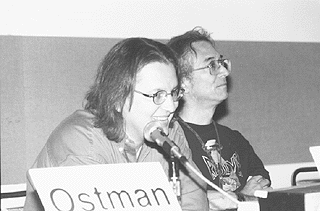Technomancers
Computer Gaming Gurus at SXSW Interactive
By Allen Varney, Fri., March 6, 1998
 Check the shelves at CompUSA or Computer City. After all those years lurking waaaay at the back of the store, there they are now, right up front: hundreds of computer games. Of course! What else drives the sale of new computers but today's games? You can still trudge along on a 33mhz DOS fossil to type sick-leave memos, or run a 40-cell spreadsheet, or write a preview of the South by Southwest Interactive Festival, March 13-17 at the Convention Center in downtown Austin. But to play Ultima Online or Quake II? Here, take this straw and suck some cement.
Check the shelves at CompUSA or Computer City. After all those years lurking waaaay at the back of the store, there they are now, right up front: hundreds of computer games. Of course! What else drives the sale of new computers but today's games? You can still trudge along on a 33mhz DOS fossil to type sick-leave memos, or run a 40-cell spreadsheet, or write a preview of the South by Southwest Interactive Festival, March 13-17 at the Convention Center in downtown Austin. But to play Ultima Online or Quake II? Here, take this straw and suck some cement.
Computer games today push the envelope like Chuck Yeager on Benzedrine. Unless you bought your machine six months back, you'll have to upgrade to play. Trust me: Computer games are earning new billions for Michael Dell, and he doesn't even make them.
Who does make these games? Mostly, the people on SXSW Interactive's "Gaming Trends" programming track: luminaries like Richard Garriott, Ultima mastermind and golden boy at Origin here in Austin; high-tech evangelists like Brian Moriarty, former Interplay exec, now MPATH's guru of online gaming; and thinkers like Chris Crawford, who designed the classic Eighties games Balance of Power and Legionnaire, and currently organizes Sunnyvale's prestigious annual Computer Game Developers' Conference.
From Sunday, March 15 through Tuesday, March 17, these stars join over two dozen other game company representatives, many from right here in Silicon Gulch (Digital Anvil, Human Code, Illusion Machines, Crack Dot Com), on panels about next-generation technologies, online gaming (isn't that the same thing?), gaming careers, and "Music for Games" (with Austin's own George Sanger, aka The Fat Man). Once an oxymoron, "Games for Girls" now get a room of their own, or at least a panel with reps from Girl Games, Her Interactive, and Hasbro.
Some cool panels dovetail with the SXSW Film Festival, including an entire "Digital Hollywood" program track. "Transforming Games to Films" features producers and executives from Digital Anvil, Chris (Wing Commander) Roberts's hot post-Origin startup. They'll have much to say about the big-budget Wing Commander movie Roberts is now shooting in Luxembourg. (Luxembourg?)
They could probably add a lot about how the computer game industry is replaying the early days of moviemaking, on high fast-forward. Computer games were once made in a programmer's lonely bedroom, then by frantic little companies with eight guys and a disk duplicator. Now, as each game's development cost escalates into the millions, bottom-line megacorps own the business; smaller companies die away or turn into design studios. In two decades, the computer game industry has rerun 60 years of movie history, from Thomas Edison to about 1950. And the pace is picking up.
|
|
Austin's game companies are definitely keeping abreast in this race, and may be pulling ahead. Origin has scored a solid success with Ultima Online, though the company remains a pawn in the inscrutable political maneuvering of its California owner, Electronic Arts. Smaller Austin studios reward close attention, like Human Code and its hip Codeworks spinoff. Codeworks' ambitious Chief Human, Chipp Walters, hopes to lead his company beyond award-winning edutainment titles into innovative new fields. On Tuesday at SXSW Interactive, Walters' kickoff speech, "Media Clusters: Back Up and Go Forward," will probably hint at his plans.
Other Austin companies have secured a greater prize than mere awards: venture capital. Digital Anvil, for example, has Microsoft's big stick in its pocket. Longtime Origin producer Warren Spector now runs the Austin office of Dallas-based ION Storm, funded by deep-pocketed founder John Romero (DOOM, Quake).
Of course, Austin also has its share of game companies living from contract to contract, and probably more than its share of doomed hopefuls that now survive only as dusty, outdated websites. Yet the close, even clubby nature of the biz - fostered by conferences like SXSW Interactive - lets talented creators establish major reputations even as their companies burn around them. You'll see them at the Festival: big-time talents who have worked in the industry for years - any company would hire them on four hours' notice - yet who (through no fault of their own) have never actually shipped a game. Over time, these people can become tense and jumpy.
It's one more weird symptom of the computer game industry's headlong pace, its cutthroat competition, and its deadly blockbuster mentality. Thousands of games do actually ship each year, but only about two dozen corral most of the profits. The rest, products of one or two (or more!) years' work by dozens of talented people, die ignominious deaths of neglect. Something has to change. Everyone keeps hoping, or fearing, it'll change soon.
Expect to hear a lot more about all this at the SXSW Interactive Festival. It kicks off Friday, March 13, with a half-day seminar called "Business Opportunities in the Japanese Software Market," co-sponsored by the Houston office of the Japan External Trade Organization (JETRO). On Saturday, multimedia production facilities around Austin hold open house for SXSW Interactive attendees, and there's a big party that night at GSD&M's Idea City building on West Sixth Street.
The conference proper runs from Sunday, March 15 to Tuesday, March 17. Panels run from 10am-5pm each day, as does the big SXSW Interactive Festival Trade Show (see the insert in this issue for exhibitors). Evening events include interactive storytelling by Bob Linehan (Sunday) and Ethos Productions' cybernetic opera X&Y (Monday). The closing party, Tuesday night at the Electric Lounge (302 Bowie, 476-FUSE), features the San Francisco band the Gone Jackals. Executive Passes to the Interactive Festival are $225 at the door ($125 for students). Gold Passes (admission to both Film and Interactive Festivals) are $400. Platinum Passes (good for all SXSW events) are $695. For more information, check http://www.sxsw.com.
Austin game designer Allen Varney ([email protected]) has worked freelance for Origin, Microprose, Looking Glass Technologies, and Interplay.







